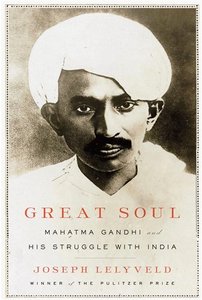Title: Great Soul: Mahatma Gandhi and His Struggle With India
Author: Joseph Lelyveld
Banned In: parts of India
Event Honoring Pulitzer Prize Winning Author Cancelled by: Foundation for Excellence in Santa Cruz, California
For: raising the possibility that Gandhi had a homosexual relationship
How much did I not know about Gandhi? So much! This book was fascinating. Everything was meticulously researched, but also very well-written so I never felt like I was reading a history text book. Joseph Lelyveld’s Pulitzer is well-deserved; he really understands how to use story in a non-fiction context, which is, I think, something many biographers struggle with. I was particularly interested to learn about Gandhi’s time in South Africa, and how this British-educated, suit-wearing lawyer transformed gradually into the leader of a spiritual and political movement.
I can also see why this book might upset some people. You can tell Lelyveld has the utmost respect for Gandhi, but he’s also a researcher interested in the truth, even when that truth differentiates from Gandhi’s own autobiography. He always cites multiple sources, and postulates about the most likely reasons why they might disagree. Though the story it tells is still overwhelmingly admiring and positive, it is difficult for some people to see this person not as a saint, but as a man. One who sometimes made mistakes or changed his mind or acted for political and practical rather than ideological reasons. And that’s not even taking into account the specific question of his relationship with Hermann Kallenbach.
Lelyveld isn’t just making wild claims to create a literary sensation. As always, he backs his postulations up with evidence:
“They were a couple,” Tridip Suhrud, a Gandhi scholar, said when I met him in the Gujarati capital of Gandhinagar. That’s a succinct way of summing up the obvious–Kallenbach later remarked that they’d lived together “almost in the same bed”–but what kind of couple were they? Gandhi early on made a point of destroying what he called Kallenbach’s “logical and charming love notes” to him, in the belief that he was honoring his friend’s wish that they be seen by no other eyes. But the architect saved all of Gandhi’s, and his descendants, decades after his death and Gandhi’s, put them up for auction. Only then were the letters acquired by the National Archives of India and, finally, published. It was too late for the psychoanalyst Erik Erikson to take them into account, and most recent Gandhi studies tend to deal with them warily, if at all. One respected Gandhi scholar characterized the relationship as “clearly homoerotic” rather than homosexual, intending through that choice of words to describe a strong mutual attraction, nothing more. The conclusions passed on by word of mouth in South Africa’s small Indian community were sometimes less nuanced. It was no secret then, or later, that Gandhi, leaving his wife behind, had gone to live with a man.
Lelyveld goes on to describe the course of the relationship–whether close friendship or romantic or a mix of the two–and quotes from the letters often, as well as other sources. He certainly raises the possibility, but, in the end, makes it clear that any sexual aspect was ultimately of less importance historically than the close friendship that helped develop many of Gandhi’s ideas. To me, this chapter is a nuanced and well-researched treatment of a subject which another writer might have exploited more crassly for attention. But I can see that some people would be unhappy with any perceived criticism of Gandhi. Though the possibility of a homosexual or homoerotic relationship is hardly a criticism–especially as Lelyveld writes it–it’s the sad reality of our society that some will take it as such.
If you’re interested in reading more, the book’s Wikipedia entry has quotes from the letters, and more about the controversy this book caused.
Previously: The Awakening
Next: Pit Bulls and Tenacious Guard Dogs
